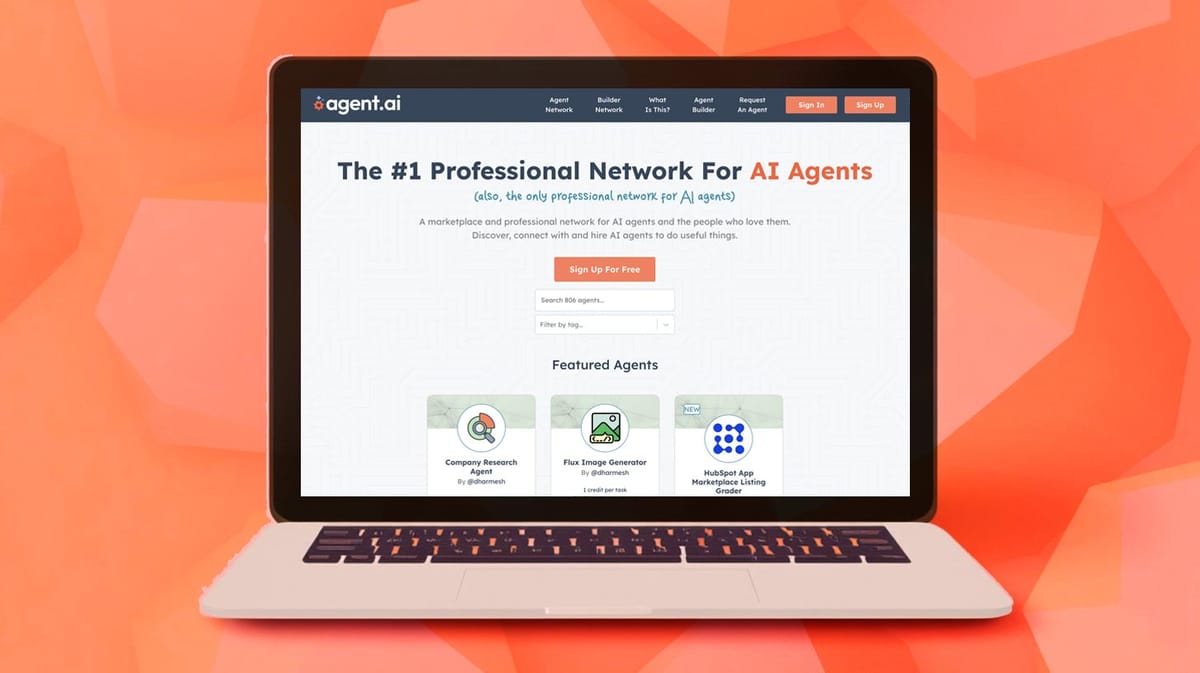Test Drive the Future of Work with Agent.ai
Everyone's talking about AI agents. Dharmesh Shah is actually delivering them. Here's my review...

If you’ve spent any time in marketing circles, you know Dharmesh Shah. HubSpot Co-Founder. CTO. Social media rock star. The guy who turned a scrappy CRM startup into a $30+ billion marketing powerhouse. So, when he casually dropped on LinkedIn last June that he’d built an AI agent for company research, it caught my attention. An automated bot that combs the internet and spits out competitor analyses, cutting hours out of the old manual research grind? I had to see if this was legit or just another novelty.
Because let’s face it, autonomous AI agents sound futuristic and cool, but most of us have no clue how to actually put them to use. We hear about them daily—these digital teammates that will soon write our emails, create our content, handle customer service, and make all the human grunt work disappear. All autonomously. But how does the average marketer even get her hands on them?
That’s where Agent.ai comes in. Or, as Dharmesh calls it, “the #1 Professional Network For AI Agents (also, the only professional network for AI agents).” Tongue-in-cheek aside, he's onto something. Since that casual mention in June 2024, Agent.ai has exploded into a platform with over 800 AI agents, 23,500 human profiles, and more than 500,000 users as of this writing. It reminds me of early app stores: a flurry of new tools—in this case, AI agents—popping up every day for tasks you never even realized could be automated.
I got my first taste of Agent.ai when it was still a quiet beta project. Running a B2B marketing agency, competitive landscape research is an essential (if tedious) part of onboarding new clients. Hours spent Googling, populating spreadsheets, comparing UVPs and product offerings—every new niche was a small mountain of data wrangling. Dharmesh’s Company Research Agent promised a deep report with demographic information, funding data, web traffic trends and competitor analysis, in minutes. Honestly, it was a game-changer. That initial version wasn’t perfect—some results were laughably off—but the concept was compelling enough that I stuck around to see how the platform would evolve.
Fast forward a few months, and now Agent.ai is more formalized—complete with a well-organized website, a community of builders, and those 800+ agents spanning everything from marketing audits to customer service triage. You sign up for free, get 100 credits, and each time you run an agent, it costs a credit. No commitment, no elaborate paywalls. Just jump in and start testing. I’ve tried some that are rock-solid, like a Website Domain Valuation Expert that pegged prices with far more detail than GoDaddy’s own tools. Others flopped. One “Competitive Landscape” agent offered three supposed “major players” in an industry I was analyzing—two of which appeared to be fictional companies.
Dharmesh sees those hits and misses as part of the process. In a recent newsletter (which I highly recommend), he talked about a “virtuous loop” forming: More users attract more builders. More builders create more useful agents. More useful agents bring in more users. Rinse and repeat, and eventually you reach a critical mass where the platform becomes indispensable because each new agent or user amplifies the value of the entire network.
For marketers, especially those curious about how to weave AI into everyday workflows, it’s a fascinating sandbox. The potential is hard to ignore: If enough developers and enthusiasts continue to build specialized agents, we might soon outsource a big chunk of the repetitive tasks that keep us chained to our desks. Then again, there’s also the looming question of what happens if (or when) Agent.ai folds into HubSpot’s ecosystem. For now, anyone can access it. Tomorrow, it might be a feature exclusively for HubSpot customers. There’s a sense of now or never about it—experiment with agents today or be locked out tomorrow.
Of course, not everyone is sold on the AI agent idea. There’s understandable skepticism about data accuracy, the reliance on large language models that can hallucinate, and the notion that “autonomous” bots might run amok without proper oversight. Truth is, none of these agents are 100% plug-and-play perfect. They need direction, they need quality inputs, and they’re still prone to errors. Even so, there’s a tangible glimpse of the future here. Dharmesh’s vision isn’t just about automating tasks for marketers; he sees a near future where AI agents also talk to each other—coordinating in the background, spinning up entire workflows with minimal human prompting.
Do we believe it? That depends on how much faith you have in the unstoppable trajectory of AI. Personally, I’m all in. I’ve seen enough to know these early prototypes are just that: early. They’ll get better, probably faster than we expect. And if you believe Dharmesh’s track record (and let’s be honest—he’s got a pretty good one), you might suspect that Agent.ai is on a similar path to his previous projects, like WordPlay and that whole HubSpot thing.
So here’s my advice, straight up: If you’re curious about AI agents and want a chance to shape the next frontier of marketing automation, jump in while the playground is still open to everyone. Tinker with a few agents, maybe even build your own if you’re feeling adventurous (it's surprisingly easy). You’ll likely encounter buggy or undercooked offerings, but you’ll also see flashes of brilliance that just might reshape how you approach your daily marketing tasks.
Because in six months—or a year—when the big CRM players either gobble up or replicate what Agent.ai has started, this will look less like an MVP and more like a mandatory part of the marketing toolbox. And by then, if you haven’t already been exploring the possibilities, you’ll be left playing catch-up.
Agent.ai is giving us a front-row seat to the evolution of hybrid human-AI teams—and possibly a peek at how we’ll all be working in the not-so-distant future. And if Dharmesh Shah has his way, the early days of community building and freewheeling experimentation will be exactly what propels the platform to that “critical mass” he’s anticipating.
Time, as always, will tell. But if you ask me, I wouldn’t bet against the guy who’s already built one marketing movement—and seems poised to lead the next.






